5 Quagmires President Obama (Probably) Won't Address in His Last SOTU
Messes for a legacy.
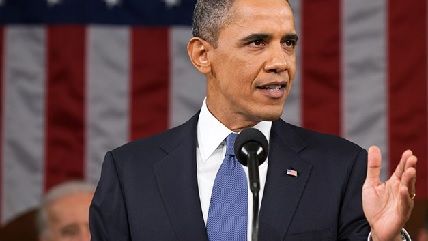
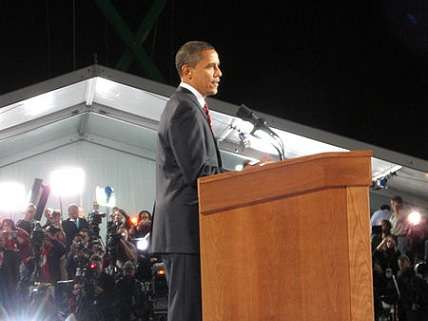
Barack Obama's election as president of the United States was supposed to be transformative.
After being officially nominated for president by the Democratic Party in the summer of 2008, he promised that "this was the moment when the rise of the oceans began to slow and our planet began to heal," and that "this was the moment when we ended a war and secured our nation and restored our image as the last, best hope on Earth."
The war he was talking about was the Iraq War. Obama had called it a "dumb war" back in 2002 when running for Senate out of Illinois. The same basic idea continued in his presidential campaign. Obama ran on a platform of disengaging the U.S. from military operations in Iraq and refocusing on Afghanistan, a "good war" that, Obama argumued, was being ignored because the U.S. was being distracted by Iraq.
Barack Obama entered the Oval Office in January 2009 with the U.S. engaged in two wars and promising to bring both of them, at different paces, to a close. His administration phased out "war on terror" terminology in 2009, but not the policies.
His mention of foreign policy successes have become rarer and rarer with successive States of the Union. He will almost certainly not take credit one last time for ending the war in Iraq. He stopped doing so more than a year ago, as ISIS gained ground in post-war Iraq. At last year's address, Obama celebrated the end of the combat mission in Afghanistan. He almost certainly won't mention the complications with that narrative since then.
Just a year from leaving office, Obama is poised to leave his successor with the United States engaged in wars in at least three countries and with messes partially of America's making littering the world. It won't be part of the legacy he claims tonight.
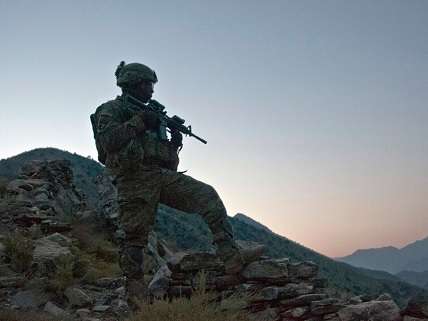
1. Afghanistan
In his 2008 campaign, Obama promised to pivot from the war in Iraq to the war in Afghanistan, which he argued had been overshadowed by the distraction in Iraq. In the 2012 election, he campaigned on having ended the war in Iraq and, after ordering a "surge" of troop numbers in Afghanistan, on ending the war in Afghanistan by 2014. It didn't happen.
Now the U.S. plans to keep just under 10,000 troops in Afghanistan through the end of Obama's term, with Afghanistan's fragile government opening the door for an even longer stay. In 2012, the World Bank estimated 97 percent of the country's gross domestic product came from one form or other of international spending.
With the presidential candidates for 2016, when they discuss foreign policy, interested in talking up more intervention in Syria or how the Iraq war and/or subsequent withdrawal contributed to the rise of the Islamic State in Iraq and Syria (ISIS), U.S. military involvement in Afghanistan threatens to continue to be both indefinite and ignored.
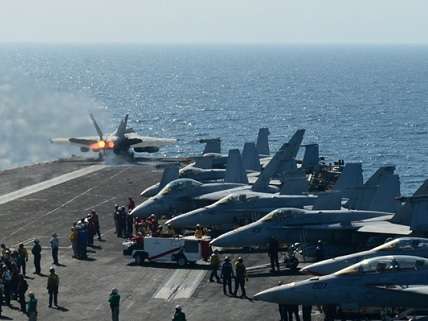
2. Iraq
In the 2008 election, Barack Obama promised to bring the Iraq War to an end. But at the time, the Bush administration was already negotiating a status of forces agreement (SOFA) with the government of Iraq that, because of Iraq's refusal to extend immunity to U.S. military personnel and contractors, ended up being a road map to end the war in Iraq by the end of 2011.
As the SOFA deadline approached, President Obama tried to extend it, attempting to negotiate for 10,000 U.S. troops to be permitted to remain in Iraq. The Iraqi government resisted, and President Obama was forced to stick to candidate Obama's stance on Iraq thanks to a deal struck by George W. Bush. That series of events didn't stop President Obama from taking credit for ending the war in Iraq when running for re-election in 2012.
And taking credit for ending the war in Iraq in the 2012 presidential campaign didn't stop Obama from calling it "bogus and wrong" to place the responsibility for ending the Iraq war on him when the Islamic State in Iraq and Syria (ISIS) started making significant territorial gains in Iraq. He made it clear he did not consider himself responsible for the decision to withdraw U.S. troops from Iraq, even as he had taken credit for that decision in order to garner support in his re-election campaign. Obama also questioned the premise that a U.S. troop presence would have had an effect on the dysfunctional Iraqi politics he blamed for ISIS making gains in Iraq.
And that doubt about the usefulness of U.S. troops on the ground in Iraq in inducing stability in the country, in turn, didn't stop President Obama for recommitting military assets to Iraq. This June, the U.S. deployed 500 military personnel into Iraq as part of "Operation Inherent Resolve," the U.S.'s anti-ISIS military campaign. The war in Iraq never ended. And last month saw the first confirmed U.S. combat death in Iraq since 2011, with Defense Secretary Ashton Carter acknowledging U.S. troops were and would be participating in direct action on the ground that put them in harm's way. The Iraqi government responded by saying it didn't ask for, nor did it want, U.S. ground operations in its country. It's unlikely the U.S. will pull back from Iraq next year. Instead…
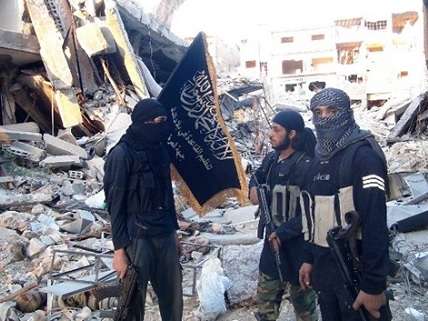
3. Syria
After the Iraqi government expressed opposition to U.S. troops being deployed in the country, the U.S. announced it would be sending "fewer than 50" special ops forces into Syria.
The U.S. sent 400 troops in the spring to train Syrian rebels to fight ISIS. The goal was to train more than 5,000 rebel soldiers a year for three years. The $500 million effort has yielded "four or five" active fighters. The Defense Department is seeking $600 million more to train rebels.
And a year ago last September the U.S. started bombing ISIS targets in Syria. That came a year after the Obama administration tried, but failed, to commit the U.S. to military action against the government of Bashar Assad in Syria, who the U.S. insists must be replaced for peace to be achieved in Syria. The U.S.'s official opposition to Assad continues even as its focus has shifted toward ISIS, which launched a coordinated series of terrorist attacks in Paris.
In September, Russia, Assad's most powerful ally, started launching airstrikes in Syriameant to shore up Assad's government, and, Russia insisted, attack ISIS positions. A few weeks before the Paris attacks, an ISIS bomb took down a Russian commercial jet over Egypt. Anne Patterson, the assistant secretary of state for near east affairs, told the House Foreign Affairs Committee that up to 90 percent of Russian airstrikes in October were against moderate factions of Syrian rebels. Nevertheless the Joint Chiefs of Staff chairman, Gen. Joseph Dunford, insisted Russia was not targeting the Free Syrian Army, the primary U.S.-backed rebel group, when Sen. John McCain (R-Ariz.) asked whether the U.S. would support the rebels it backed if they were attacked by Russia.
Late last month, the U.S. and Russia agreed to regulations on aircraft and drone flights in Syria, since they're both operating in the air over that country. Earlier this week, Turkey shot down a Russian fighter jet it said had crossed into Turkish airspacde. Russia's got troops on the ground in Syria, like the U.S., as does Iran. Russia and Iran, and Iraq and Syria, are also cooperating on anti-ISIS operations in Iraq and Syria, but the U.S. has largely aligned with other regional powers, like Jordan and Saudi Arabia, ensuring continued involvement in the ongoing Syrian conflict.
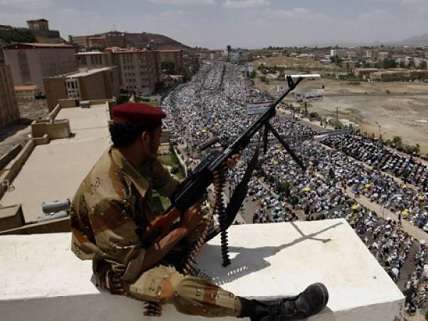
4. Yemen
As recently as September 2014, President Obama was pointing to U.S. counterterrorism operations in Yemen as a model of success for the campaign against ISIS. Since then, Houthi rebels drove the government of Abd Rabbuh Al-Hadi, out of the capital city of Sanaa. Al-Hadi had replaced long-time President Ali Saleh, who stepped down after pressure from "Arab spring" protests. A proxy war broke out between the Iranian-backed rebels, who hold Sanaa, and the ousted government, backed by Saudi Arabia and the U.S., which operates out of the city of Aden. The Obama administration provided support as Saudi Arabia launched airstrikes against rebel positions in Yemen.
Since 2002, the U.S. has launched up to 225 drone strikes in Yemen, according to the Bureau of Investigative Journalism, with up to 1215 people, and 167 civilians and 18 children, killed in those strikes, with the most recent confirmed strike coming in September. The U.S. suspended its counterterrorism operations in Yemen, briefly, at the beginning of the year. Before the outbreak of war, there were concerns by the U.S. that the Yemeni government was using U.S. drone strikes to target local enemies. Now elements of Al-Qaeda in the Arabic Peninsula are reportedly fighting against the Iranian-backed Houthi rebels that Saudi Arabia and the U.S. are also working to dislodge. President Obama's "model of success" in the war on terror has become anything but.
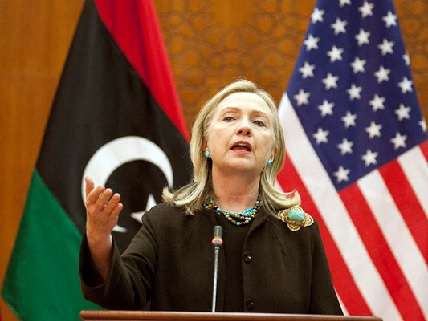
5. Libya
Even where the Obama administration's military interventions have managed to be as limited in scope as envisioned, limited engagement on the part of the United States doesn't guarantee limited consequences.
In 2011, President Obama committed the U.S. military to intervention in Libya's burgeoning civil war, based on a United Nations Security Council resolution Obama said he pushed along with U.S. allies at the behest of the Arab League, which wanted an intervention that would "save lives in Libya."
While the U.S. insisted regime change wasn't a goal of the U.S.-backed intervention in the Libyan civil war, Hillary Clinton, who was secretary of state at the time, took credit for the Libyan leader Col. Qaddafi's ouster. Now, as the Democratic presidential frontrunner, Clinton defends the Obama administration's decision to intervene in Libya, even as its left Libya on the brink of being a failed state and helped to destabilize the wider regions, with Libyan weapons and fighters joining conflicts from Syria to Nigeria. The U.S. is involved on both sends of that impact zone, with President Obama announcing the deployment of 300 troops to Cameroon to assist a regional force battling Nigeria's Boko Haram less than two weeks after announcing the deployment of special ops forces in Syria.
President Obama may have abandoned the term "global war on terror" when he entered office, but he's leaving his successor with one in everything but name.


Show Comments (62)